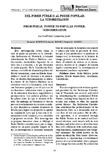Del poder público al poder popular: la subordinación

View/
Date
2022-03-07Author
Palabras Clave
Poder público, Poder popular, Estado democrático, Socialismo, ConstituciónPublic power, People’s power, Democratic state, Socialism, Constitution
Metadata
Show full item recordAbstract
Esta investigación revisa cómo se creó un poder no previsto en la Constitución
Bolivariana de Venezuela, y terminó subordinando los Poderes Públicos constitucionales,
haciéndolos depender de su dirección y actuación, a lo que dictamine el poder popular. En la
Constitución Bolivariana
se estableció el modelo político del Estado venezolano, como un Estado democrático
y social de Derecho y de justicia. Para su efectivo funcionamiento se articula
a través de los Poderes Públicos en su estructura vertical y horizontal, cada rama con funciones
propias y en el ejercicio de
sus funciones colaboraran entre sí; gozando de autonomía funcional, organizativa y
presupuestaria. Los poderes públicos son
los pilares sobre los que se sostiene el Estado. Sin embargo, en Venezuela se vive un
proceso revolucionario de carácter socialista cuya finalidad es cambiar el modelo de
Estado; para lograr ese propósito se aprobó un conjunto de leyes que le dan vida al denominado
estado comunal, y así consolidar el propósito socialista. Esta investigación
se propone demostrar cómo se doblegó al Poder Público constitucional, por el surgimiento de un
poder popular surgido de la
ley. La investigación se encuentra orientada bajo los principios de la historia descriptiva y
crítica; por estar en presencia de eventos que se han producido y se producen en tiempo real, lo
ubicamos en la historia de tiempo presente, en la historia de lo inmediato; el método de síntesis
es el hermenéutico;
inscrita en la categoría de historia legal y constitucional. La investigación es documental,
analítico-explicativa.
Collections
Información Adicional
| Otros Títulos | From public power to popular power: subordination |
| Correo Electrónico | carloscasanova57@gmail.com |
| Editor | SaberULA |
| ISSN | ISSN: 1690-3544 |
| Resumen en otro Idioma | This investigation reviews how a power not provided for the Bolivarian Constitution of Venezuela was created, and ended up subordinating the constitutional Public Powers, making them depend on their direction and action, to what the popular power dictates. The Bolivarian Constitution established the political model of the Venezuelan State, as a democratic and social State of law and justice. For its effective operation, it is articulated through the Public Powers in its vertical and horizontal structure, each branch with its own functions and in the exercise of its functions they will collaborate with each other; enjoying functional, organizational and budgetary autonomy. The public powers are the pillars on which the State stands. However, Venezuela is experiencing a revolutionary process of a socialist nature whose purpose is to change the state model; To achieve this purpose, a set of laws was approved that give life to the so-called communal state, and thus consolidate the socialist purpose. This research aims to demonstrate how the constitutional Public Power was bowed down, by the emergence of a popular power arising from the law. The research is oriented under the principles of descriptive and critical history; by being in the presence of events that have occurred and are occurring in real time, we place it in the history of present time, in the history of the immediate; the synthesis method is hermeneutical; registered in the category of legal and constitutional history. The research is documentary, analytical-explanatory. |
| Colación | 78-87 |
| Periodicidad | Anual |
| Página Web | http://www.saber.ula.ve/heuristica/ |
| País | Venezuela |
| Institución | Universidad de Los Andes |
| Sección | Heurística: Artículos |





